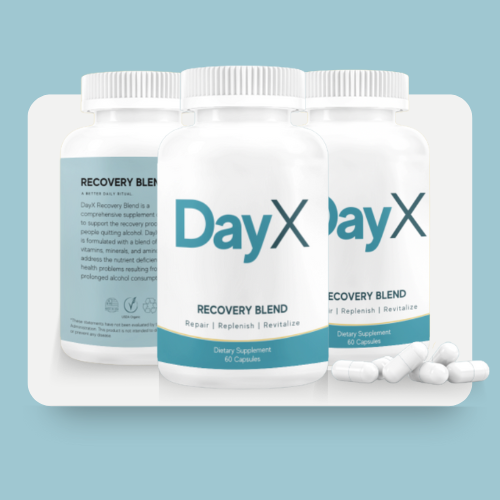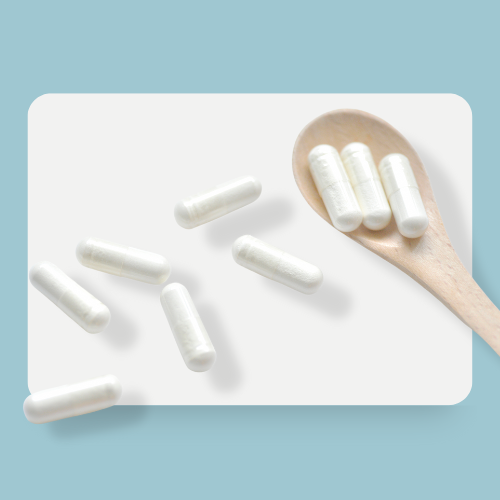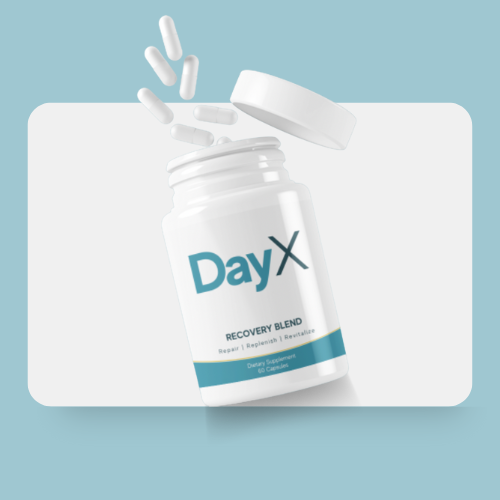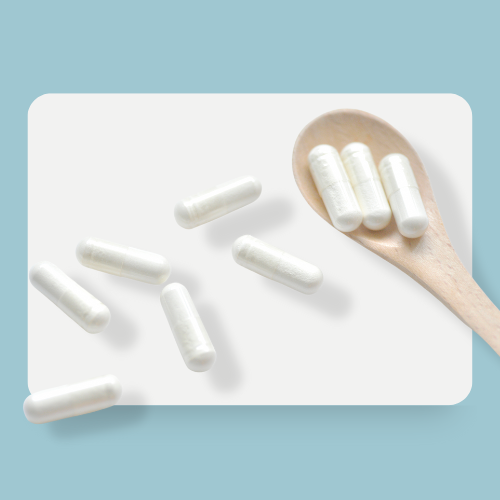Beginning a sobriety journey is difficult, but worth it.
That's why we've developed DayX Recovery, a daily multivitamin specifically formulated to support liver health and promote overall wellness for individuals quiting alcohol.
-

 Sold out
Sold outDayX Recovery (90-day supply)
Regular price $60.00 USDRegular priceUnit price per$75.00 USDSale price $60.00 USDSold out -

 Sold out
Sold out
Evidence based Ingredients | case study backed
Our Ingredients
Super B-Complex
Vitamin B1 (thiamine), B3 (niacin), B6 (pyridoxine), B9 (folate), and B12 (cobalamin) are important nutrients that play a role in many bodily functions, including metabolism, nerve function, and the production of red blood cells. They may help in the recovery from alcoholism by supporting the body's overall health and by addressing some of the nutrient deficiencies that can occur as a result of alcohol consumption.
Alcohol can interfere with the absorption and metabolism of these vitamins, leading to deficiencies that can contribute to the development of alcohol-related health problems. For example, a deficiency in vitamin B1 can cause a condition called Wernicke-Korsakoff syndrome, which is characterized by confusion, memory loss, and difficulty walking. A deficiency in vitamin B3 can lead to a skin condition called pellagra, which is characterized by redness, itching, and sensitivity to light. A deficiency in vitamin B6 can cause anemia, a condition in which the body doesn't have enough red blood cells to deliver oxygen to the body's tissues. A deficiency in vitamin B9 can cause a variety of problems, including anemia, birth defects, and an increased risk of cancer. A deficiency in vitamin B12 can cause anemia, nerve damage, and cognitive problems.
Vitamin C
Vitamin C is an important nutrient that plays a role in many bodily functions, including the production of collagen, the maintenance of healthy skin, and the support of the immune system. It may aid in the recovery from alcoholism by supporting overall health and by addressing some of the nutrient deficiencies that can occur as a result of alcohol consumption.
Alcohol can interfere with the absorption of vitamin C from the digestive tract. This is because alcohol can damage the cells that line the gut, which can impair the absorption of nutrients. Additionally, alcohol can increase the excretion of vitamin C in the urine, leading to a loss of this nutrient from the body.
Heavy alcohol consumption can also cause a deficiency in vitamin C because it can increase the body's need for this nutrient. This is because alcohol can cause oxidative stress in the body, which can increase the demand for antioxidants like vitamin C. Alcohol can also impair the immune system, which can increase the need for vitamin C to support the immune system's function.
Overall, alcohol consumption can lead to a deficiency in vitamin C through a combination of impaired absorption, increased excretion, and increased demand for this nutrient. This is why it's important for people with alcoholism to get adequate amounts of vitamin C through their diet or through supplementation.
Vitamin D3
Vitamin D3 is a nutrient that plays a role in many bodily functions, including bone health, immune function, and the regulation of blood pressure. It may aid in the recovery from alcoholism by supporting overall health and by addressing some of the nutrient deficiencies that can occur as a result of alcohol consumption.
Alcohol can interfere with the absorption and metabolism of vitamin D, leading to deficiencies that can contribute to the development of alcohol-related health problems. For example, a deficiency in vitamin D can cause a condition called osteomalacia, which is characterized by weak bones and muscle weakness. It can also weaken the immune system, making a person more susceptible to infections.
Supplementation with vitamin D3 may help to correct these deficiencies and support the recovery process in people with alcoholism.
Alcohol can cause a deficiency in vitamin D3 for several reasons. First, alcohol can interfere with the absorption of vitamin D3 from the digestive tract. This is because alcohol can damage the cells that line the gut, which can impair the absorption of nutrients. Additionally, alcohol can increase the excretion of vitamin D3 in the urine, leading to a loss of this nutrient from the body.
Heavy alcohol consumption can also cause a deficiency in vitamin D3 because it can increase the body's need for this nutrient. This is because alcohol can impair the function of the liver, which is responsible for converting vitamin D3 into its active form. Alcohol can also impair the function of the kidneys, which are responsible for activating vitamin D3.
Overall, alcohol consumption can lead to a deficiency in vitamin D3 through a combination of impaired absorption, increased excretion, and increased demand for this nutrient. This is why it's important for people with alcoholism to get adequate amounts of vitamin D3 through their diet or through supplementation.
Magnesium
Alcohol can cause a deficiency in magnesium for several reasons. First, alcohol can interfere with the absorption of magnesium from the digestive tract. This is because alcohol can damage the cells that line the gut, which can impair the absorption of nutrients. Additionally, alcohol can increase the excretion of magnesium in the urine, leading to a loss of this nutrient from the body.
Heavy alcohol consumption can also cause a deficiency in magnesium because it can increase the body's need for this nutrient. This is because alcohol can impair the function of the liver, which is responsible for regulating the body's levels of magnesium. Alcohol can also cause inflammation in the body, which can increase the demand for magnesium to help manage this process.
Overall, alcohol consumption can lead to a deficiency in magnesium through a combination of impaired absorption, increased excretion, and increased demand for this nutrient. This is why it's important for people with alcoholism to get adequate amounts of magnesium through their diet or through supplementation.
Acetyl-L-Caitine (ALCAR)
Acetyl-L-carnitine (ALCAR) is a compound that is involved in the metabolism of fats and the production of energy. Some research has suggested that ALCAR may aid in the recovery from alcoholism by improving cognitive function and reducing the risk of alcohol-related brain damage.
One study found that treatment with ALCAR improved cognitive function in people with alcohol dependence and reduced the risk of developing Wernicke-Korsakoff syndrome, a condition that is characterized by confusion, memory loss, and difficulty walking. Another study found that treatment with ALCAR improved cognitive function in people with alcoholic liver disease.
Milk Thistle
Milk thistle is a plant that has been used for centuries to treat a variety of health conditions. Some research has suggested that milk thistle may aid in the recovery from alcoholism by protecting the liver from damage and promoting liver function.
The active ingredient in milk thistle, silymarin, is thought to have antioxidant and anti-inflammatory properties that may help to protect the liver from damage caused by alcohol and other toxins. Some studies have found that milk thistle can improve liver function in people with alcoholic liver disease and reduce the risk of developing liver cirrhosis.
5-HTP
5-HTP (5-hydroxytryptophan) is a compound that is involved in the synthesis of serotonin, a neurotransmitter that plays a role in mood and sleep. Some research has suggested that 5-HTP may aid in the recovery from alcoholism by reducing cravings and improving mood and sleep.
One study found that treatment with 5-HTP reduced cravings for alcohol in people with alcohol dependence. Another study found that 5-HTP improved sleep quality and reduced anxiety in people with alcohol dependence.
AstraGin
AstraGin is a dietary supplement that is derived from two plant extracts: Panax notoginseng and Astragalus membranaceus. Some research has suggested that AstraGin may improve the absorption and metabolism of nutrients in the body, which may be beneficial in the recovery from alcoholism.
One study found that treatment with AstraGin improved the absorption of amino acids in people with alcoholic liver disease. Another study found that AstraGin improved the absorption of minerals in people with alcoholic liver disease.
BioPerine
BioPerine is a dietary supplement that is derived from black pepper and is known for its ability to improve the absorption of certain nutrients in the body. Some research has suggested that BioPerine may aid in the recovery from alcoholism by improving the absorption and metabolism of nutrients in the body.
One study found that treatment with BioPerine improved the absorption of curcumin, a compound found in turmeric, in people with alcoholic liver disease. Another study found that BioPerine improved the absorption of resveratrol, a compound found in grapes and red wine, in people with alcoholic liver disease.
Zinc
Zinc is a mineral that plays a role in many bodily functions, including immune function, wound healing, and the production of proteins and DNA. Some studies have found that zinc may aid in the recovery from alcoholism by supporting overall health and by addressing some of the nutrient deficiencies that can occur as a result of alcohol consumption.
Alcohol can interfere with the absorption and metabolism of zinc, leading to deficiencies that can contribute to the development of alcohol-related health problems. For example, a deficiency in zinc can cause a weakened immune system, skin lesions, and taste disturbances. Supplementation with zinc may help to correct these deficiencies and support the recovery process in people with alcoholism.

Founded by a team who wished they had DayX available when they quit alcohol.
We offer two options for purchase, a 30-day and a 90-day supply of supplements. We recommed taking DayX for three months+ for the greatest impact on longterm health.

Dedicated to Quality Ingredients
Our formula is all-natural, with no artificial additives or fillers, and is made with the highest-quality sourced ingredients, developed, packaged, and sent all from the U.S. We are committed to providing a high-quality product that our customers can trust.
Nutrition is only one piece of a recovery journey. Below are doctor and psychologist recommendations for best success.
-
Counseling and Therapy
Learn moreSeek professional guidance from licensed therapists or addiction counselors specializing in alcohol addiction recovery.
-
Online Forums and Communities
Learn moreEngage in online platforms where individuals share experiences and find support during their alcohol addiction recovery journey.
-
Find a Recovery Center Near You
Learn moreLocate nearby centers offering specialized support and treatment for alcohol addiction recovery.
-
Support Groups
Learn moreConnect with others on the path to recovery through supportive communities like Alcoholics Anonymous (AA) and Smart Recovery.
-
Sober Living Books We Love
Learn morePair text with an image to focus on your chosen product, collection, or blog post. Add details on availability, style, or even provide a review.
-
Hotlines and Helplines
Learn moreReach out to dedicated helplines for immediate assistance, guidance, and support in overcoming alcohol addiction.
-
Online Resources and Websites
Learn moreAccess reputable online sources offering educational materials, articles, and tools for alcohol addiction recovery.
-
Partner and Family Support
Learn moreAccess resources and networks to aid partners and family members in understanding and supporting their loved ones' alcohol addiction recovery.






